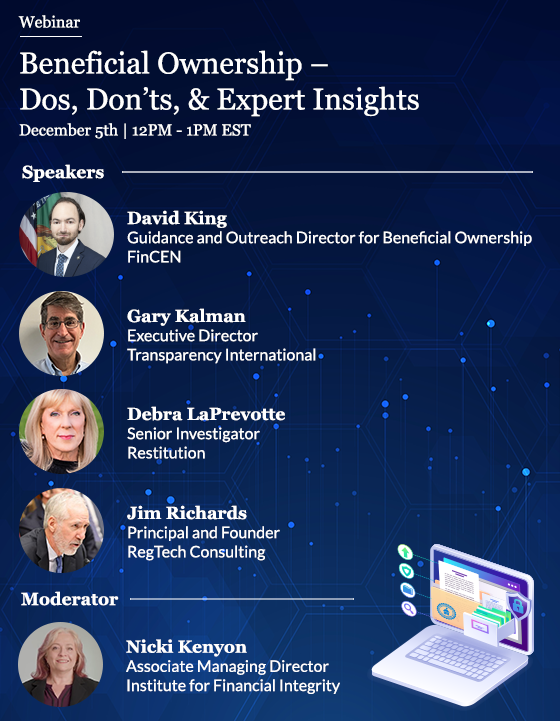Beneficial Ownership: Who Owns What?
Complexities and Challenges of Compliance
📅 October 17, 2024
📅 October 17, 2024
“Corrupt officials and criminals have long used loopholes in the U.S. financial system to hide and launder the proceeds of illicit activity. Russian oligarchs, drug cartels, and corrupt leaders from every region of the world have stashed the proceeds of their crimes in the U.S. Half of all transnational transactions use the U.S. dollar. The lack of U.S. rules has enabled both domestic fraud and transnational crime by allowing the creation of anonymously owned companies through which illicit funds flow and by providing impunity to the beneficiaries of illicit enterprises.”
– Gary Kalman, Executive Director, Transparency International U.S.
The Corporate Transparency Act (CTA), enacted in 2021, aimed to curb illicit finance and required numerous entities transacting in the United States to report to the U.S. Financial Crimes Enforcement Network (FinCEN) the identity of the real individuals or entities who ultimately own or control them. The requirement is known as beneficial ownership information.
Beneficial ownership transparency, according to anticorruption non-governmental organization (NGO) Transparency International, is a vital tool to prevent and mitigate the risk of misuse of legal entities and arrangements. Anonymous companies and trusts that obscure their beneficial owners, are key to major corruption, money laundering, tax evasion, and other financial crimes, and the lack of transparency in company ownership hinders the detection and deterrence of individuals and entities involved in illicit financial activities.
FinCEN in late 2023 released a final rule to implement the Corporate Transparency Act, and the database to collect beneficial ownership information from entities that are required to report this information (reporting entities) went into effect on January 1, 2024.
Illicit actors, including money launderers and sanctions evaders, use opaque corporate structures, including shell and front companies to hide their identities and move illicit proceeds through the United States, according to FinCEN.
Acting Deputy Assistant Director of the FBI’s Criminal Investigation Division, Steven D’Antuono, also highlighted the problem in May 2019 in a statement before the Senate Banking, Housing, and Urban Affairs Committee. D’Antuono flagged that for an illegal enterprise to succeed, criminals must be able to hide, move, and access the proceeds of illegal activities, and the use of shell and front companies that obscure the beneficial ownership of an entity is pervasive and represents a significant loophole in the U.S. anti-money laundering (AML) regime.
The global illicit finance watchdog the Financial Action Task Force (FATF) assessed in March 2024 that the United States has made progress in addressing the technical compliance deficiencies identified in relation to Recommendation 24 – Transparency and beneficial ownership of legal persons. FATF flagged that the U.S. Treasury’s Terrorist Financing and Proliferation Financing risk assessments identified instances in which shell and front companies were used by terrorist actors such as ISIS and Hizballah to move funds and that proliferation networks also rely on these entities to access correspondent relationships. The watchdog also highlighted that the CTA and the requirement to report beneficial ownership are part of the aforementioned progress in addressing the shortcomings.
FinCEN says that a corporation, limited liability company (LLC), or a company in the United States under the law of a state or Indian tribe or a foreign company registered to do business in any U.S. state may need to report its beneficial ownership to the agency. However, 23 types of entities are exempt from reporting requirements, including publicly traded companies, nonprofit organizations, and certain large operating companies. Entities such as accounting firms, pooled investment vehicles, and inactive entities also don’t have to report their beneficial ownership.
Why are big companies exempt from this reporting requirement?
FinCEN says that many big companies already must disclose their beneficial ownership information to regulators via other means, so to avoid redundant reporting requirements, the CTA focuses on smaller entities that are exploited by illicit actors to hide assets or access the financial system.
The Beneficial Ownership rule requires a reporting company to identify itself and report four pieces of information about each of its beneficial owners: name, birthdate, address, and a unique identifying number and issuing jurisdiction from an acceptable identification document, including an image of the identity document. In addition, the rule requires that reporting companies created after January 1, 2024, provide the four pieces of information and document image for company applicants.
FinCEN also allows an individual who provides these four pieces of information to the agency to obtain a “FinCEN identifier,” which can be provided in lieu of the required information.
Is the information secure? Who will have access to it?
FinCEN says that the beneficial ownership information will be subject to the same controls the U.S. government uses to protect sensitive, but unclassified, information. FinCEN—the U.S. financial intelligence unit (FIU)—already protects suspicious activity reports (SARs) and treats these reports as confidential information, and while FinCEN does exchange certain sensitive financial information with the Egmont Group of FIUs, protecting sensitive financial information is paramount for both regulators and financial institutions. Some instances of unlawful SAR disclosures involving government or bank officials have been federally prosecuted. In 2020, more than 2,100 SARs were reportedly leaked to the media in an exposé known as the “FinCEN Files,” and the individual involved in the leak of sensitive information spent five months in prison.
FinCEN notes that federal, state, local, and tribal officials will have access to the beneficial ownership information, as well as financial institutions that obtain consent from the reporting company. The information will be stored in a secure, non-public database, and the agency asserts that it will work closely with entities authorized to view the information to ensure they understand their responsibility to protect the data, use it for authorized purposes, and handle it in a way that ensures the information’s security and confidentiality.
Violations of the beneficial ownership reporting requirements could result in civil penalties, fines, and criminal penalties of up to two years in prison. An individual committing a willful violation could simply fail to file the needed information, or intentionally file fraudulent information. In addition, failure to correct or update beneficial ownership information that was previously provided to FinCEN can result in penalties as well.
Reporting companies created or registered to do business in the United States before January 1, 2024 must file their beneficial information by January 1, 2025, and newly created or registered companies have 90 calendar days to file the identification of their beneficial owners after they receive actual or public notice that their company’s creation or registration is effective.
FinCEN leaders have engaged in outreach and education regarding the critical developments in the reporting requirement space. The agency has also created an online tookit, which contains various templates and sample content structured to help information sharing, and FinCEN officials have been meeting with small business owners and other key stakeholders to help them fulfill their reporting obligations.
The CTA and the beneficial ownership database are a critical step in increasing transparency and accountability of company ownership and control structures. Regulators, think tanks, law enforcement and legislators have been flagging the transparency loopholes for years, and organizations must be diligent in understanding and meeting their obligations.
Firms and financial institutions also must understand that even if they receive authorization from their client to access the information in the beneficial ownership database, they will most likely need to supplement the insights with other research that will help them mitigate their risks. Sanctions lists, regulator guidance about illicit financial methodologies, and adverse media reports are just some of the tools that will help organizations research and corroborate information they may receive from their potential business partners or clients.
Identifying the ownership and control structures of historically opaque corporate entities is a robust step to ensure transparency and protect the U.S. and global financial systems.
Join the Institute for Financial Integrity for a comprehensive webinar that provides firms and financial institutions with knowledge and strategies they need to ensure they comply with new beneficial ownership rules and regulations.
Led by regulatory, anticorruption, and industry experts, this webinar will equip learners with insights into the nuances of the new beneficial ownership reporting requirements, address concerns about privacy, security, and access, and explore strategies to research beneficial ownership and reduce your exposure to financial crime risk.











 A $3 Billion Mistake
A $3 Billion MistakeThis site uses cookies. By continuing to browse the site, you are agreeing to our use of cookies.
Accept settingsHide notification onlySettingsWe may request cookies to be set on your device. We use cookies to let us know when you visit our websites, how you interact with us, to enrich your user experience, and to customize your relationship with our website.
Click on the different category headings to find out more. You can also change some of your preferences. Note that blocking some types of cookies may impact your experience on our websites and the services we are able to offer.
These cookies are strictly necessary to provide you with services available through our website and to use some of its features.
Because these cookies are strictly necessary to deliver the website, refusing them will have impact how our site functions. You always can block or delete cookies by changing your browser settings and force blocking all cookies on this website. But this will always prompt you to accept/refuse cookies when revisiting our site.
We fully respect if you want to refuse cookies but to avoid asking you again and again kindly allow us to store a cookie for that. You are free to opt out any time or opt in for other cookies to get a better experience. If you refuse cookies we will remove all set cookies in our domain.
We provide you with a list of stored cookies on your computer in our domain so you can check what we stored. Due to security reasons we are not able to show or modify cookies from other domains. You can check these in your browser security settings.
These cookies collect information that is used either in aggregate form to help us understand how our website is being used or how effective our marketing campaigns are, or to help us customize our website and application for you in order to enhance your experience.
If you do not want that we track your visit to our site you can disable tracking in your browser here:
We also use different external services like Google Webfonts, Google Maps, and external Video providers. Since these providers may collect personal data like your IP address we allow you to block them here. Please be aware that this might heavily reduce the functionality and appearance of our site. Changes will take effect once you reload the page.
Google Webfont Settings:
Google Map Settings:
Google reCaptcha Settings:
Vimeo and Youtube video embeds:
You can read about our cookies and privacy settings in detail on our Privacy Policy Page.
Privacy Policy